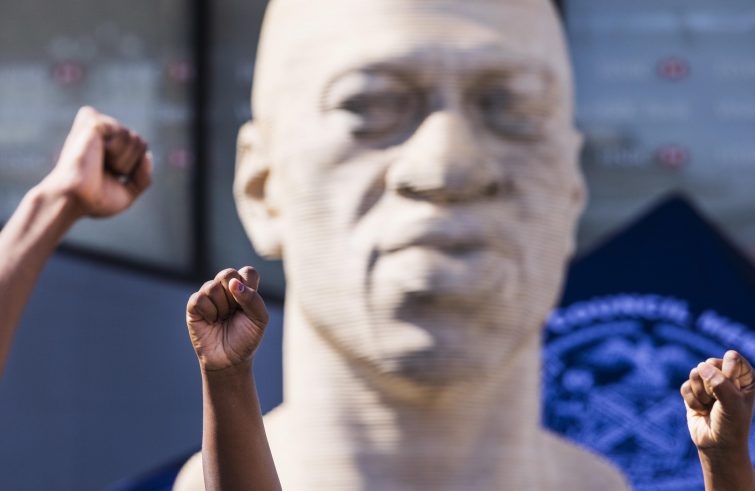
(from New York) The memory of George Floyd lives on, inspiring policies and actions against the systemic racism that is deeply rooted not only in the US but also in many nations worldwide. On Monday, in the name of the African-American from Minneapolis, who suffocated under the knee of a white police officer on 25 May 2020, UN Human Rights Commissioner Michelle Bachelet presented a report for “Protection of the Human Rights and Fundamental Freedoms of Africans and People of African Descent against the Use of Excessive Force and Violations by Law Enforcement Officials”.
The protests over the death of George Floyd were a “seminal point in the fight against racism”, writes the UN Commissioner Bachelet.
The sentencing of Derek Chauvin, a white police officer, to 22 and a half years for second-degree murder was also a major turning point. In the words of Minnesota’s Attorney General, Chauvin “abused his position of authority,” and treated Floyd with “particular cruelty”, while children watched as Floyd was pinned to the pavement, while three former officers who were present failed to intervene. They too are awaiting trial. Chauvin offered his condolences to the Floyd family but did not apologise. During the hearing, he expressionlessly glanced at Floyd’s brother, Terrence, who asked, “Why? What were you thinking? What was going through your mind when you had your knee on my brother’s neck when you knew he was no longer a threat?” The killing or wounding of black people during detentions or clashes with white police officers was so commonplace as to have been treated as inconsequential.
Officers were rarely charged and tried, or, when they did take the stand, were hardly ever convicted, which is why Chauvin’s sentence marks a watershed.
It was a historic moment of justice, which is why no protests were reported after the verdict. Floyd’s death marks a turning point in the systematic and pervasive nature of racism.
The video of George Floyd gasping for breath, until he died, and the protests that ensued, were a wake-up call that inspired Catholic communities in Minneapolis to initiate public discussions about race, justice and peace.
Catholic parishes and schools in the archdiocese responded to the plea for justice with prayers, workshops and study groups on racism, while Church dignitaries offered materials on Church teaching on racism and social justice and pledged their commitment to uprooting structural racism.
A Pew Research Center poll released at the end of March found that more than 80% of Americans say there is discrimination against Black people; 76% say this about Hispanic people and 70% see discrimination against Asian people.
Nearly half of Americans say there is “a lot” of discrimination against Black people. Angelica Kerr, African-American, is member of the editorial board of a prominent cardiology and pathology journal. After Floyd’s death she started a group of ‘Courageous Conversations’ with friends. Regular meetings are held to promote “open, honest and difficult” conversations about race, to raise awareness about the value of diversity and systemic racism.
“The tragedy of George Floyd’s death and the pandemic have accompanied us through the year, but we are now seeing some positive developments,” Kerr explained.
One of these, she said, is the celebration of Juneteenth, on June 19, marking the emancipation of African-Americans from slavery that took place in Houston in 1866. In 2021 the anniversary was proclaimed national holiday. “This celebration and the murder of George Floyd are telling us that it’s time to appreciate the contribution of African-Americans to this country. It’s time to make a fresh start and to start building a common, shared America together.”
For Izak-El Mueed Pasha, African-American Imam at the Malcolm Shabazz Mosque in Harlem, now is the time for compensation. “After centuries of slavery and struggles that have torn entire generations apart, now is the time to compensate for the labour of African Americans and it is for the descendants of Europeans to take action to make it happen.”
For Izak-El Mueed Pasha, African-American Imam at the Malcolm Shabazz Mosque in Harlem, now is the time for compensation. “After centuries of slavery and struggles that have torn entire generations apart, now is the time to compensate for the labour of African Americans and it is for the descendants of Europeans to take action to make it happen.”
Imam Pasha has tried to talk about systemic racism with “our white and European brothers,” – an expression he loathes but which are customarily required.
“In occasional meetings with them, they tell me that what their great-grandparents did is not their responsibility,” Pasha continued, clarifying that if one has benefited from their ancestors’ actions, then “the debt must be repaid, and failing to do so should be tantamount to renouncing the rights acquired from their actions.” The Imam spoke words of peace for the younger generations, to whom he hopes to offer “an atmosphere that allows them not to lose the light, to respect their existence, and to show, through education, that for us African Americans there is always another chance to see the dignity that God bestows on every human being.” The imam is sadly aware that the young people sitting in front of him will be detained, investigated, scrutinised, and will systematically be put in prison, for the sole reason that they were born black.
The Chauvin verdict did not deny justice, and yet it is also true that Floyd’s tragedy belongs to us all,
because the man who died was not just another black man, but a human being who deserved at least compassion and, finally, the chance to breathe.









